|

Landscape With Copy
After Le Pauvre Pecheur
Georges Seurat
2 December 1859 - 29 March 1891
_______________________
James Langer On Beauty
lemon hound
Searching for beauty with spoken intention is akin to seeking a pair of scissors: when you need it, it can’t be found, but when you’re not looking, your surroundings seem filled with points and edges. Recently, I’ve been fortunate enough to have been struck speechless by beauty, a beauty that has offered a great calm and an ability to cut an image of myself that I’m quite content with. This is one of the gifts of beauty, of course. It brings us to a natural expression of ourselves and can fuel one through chaos.
But I’ve also been forced to think of beauty in a rather pedestrian, daily way. Standing in queue at the grocery store with my five-year-old daughter and taking in all the airbrushed, elongated, touched up images in the magazine rack and wondering how to filter this for an impressionable child. There’s no comfort in those moments. Just an instinct to demolish lies. To let someone build their own image of beauty. There’s a poem in Patrick Warner’s latest collection, Perfection, that comes back to me insistently in those moments. The poem is called “Anorexia,” and in it, the voice of that disorder speaks to the audience as the voice of a false ideal of beauty. It’s an ugly, unsettling voice, but it becomes even more so when we discover, through Warner’s use of image and metaphor, that the voice of anorexia thinks of itself as an artist striving for an ideal. The more I think about that poem and its implications, as a poet, the more troublesome these ideas become.
So there’s no absolute truth and no ideal beauty. Can we agree? But this too can be a dangerous thought, since even that Eye of the Beholder logic, generally used to promote the validity of other perspectives, can be twisted to stifle dialogue. ...(more)
James Langer is poetry editor of The Fiddlehead
Gun Dogs
James Langer house of anansi
_______________________

The Tea Party
1949
Edward Burra
b. March 29, 1905
_______________________
Desiring visual texts
A collage and embroidery dialogue
Maria Damon and Rachel Blau DuPlessis
Rachel Blau DuPlessis
(....)
“Apprentice yourself to yourself” meant that I had done enough with the poetic tradition. I knew it well enough, but too vaguely — to be self-sardonic for a second. Let’s at least say I was not innocent. I just hadn’t used ”the poetic tradition” for me. I was too awed by it, and insufficiently narcissistic, grasping, egotistical, ruthless; this is, of course, a completely comic remark, being rather narcissistic and egotistical. I could, however, learn a bit from myself because I knew poetry well enough; thus I could (safely) apprentice myself to that self and not be excessively deceived. What followed from that acknowledgement were some key questions for making art — IF THIS, then what? And what was I going to do about it? What did I come here to tell you that only I could? So finally, I had better start; it was almost too late. It was in fact already too late. So I stopped worrying about how to begin, and simply began. That is, I begin Drafts.
Clearly that visual event was like a divining rod. But it did not lead directly to more visual artworks....(more)
_______________________

Café
c.1928-29
Edward Burra
_______________________
Interview with Wendy Brown
Broken Power Lines
{ 2010 02 27 }
(....)
CPS: You have argued, speaking of neoliberalism, you have argued that neoliberalism does not simply promote economic policies but to quote you “disseminates market values into every sphere of human activity.” What distinguishes your perspective here from the despair found in someone like Adorno? What would it require to translate the despair that many people experience in very personal and de-politicized ways into a form of political mobilization?
Wendy Brown: That is an interesting question because it assumes that neoliberalism produces despair. I wish it did but I am not convinced that it does. I think that the process that some of us have called neoliberalization actually seizes on something that is just a little to one side of despair that I might call something like a quotidian nihilism. By quotidian, I mean it is a nihilism that is not lived as despair; it is a nihilism that is not lived as an occasion for deep anxiety or misery about the vanishing of meaning from the human world. Instead, what neoliberalism is able to seize upon is the extent to which human beings experience a kind of directionlessness and pointlessness to life that neoliberalism in an odd way provides. It tells you what you should do: you should understand yourself as a spec of human capital, which needs to appreciate its own value by making proper choices and investing in proper things. Those things can range from choice of a mate, to choice of an educational institution, to choice of a job, to choice of actual monetary investments – but neoliberalism without providing meaning provides direction. In a sad way it is seizing upon a certain directionlessness and meaninglessness in late modernity. Again, I am talking mainly about the Euro-Atlantic world: without providing meaning, it provides direction. So I think it is quite a different order of things from the one that Adorno was describing. ...(more)
_______________________
Science and Moral Life
The Hedgehog Review
Vol. 15, No. 1 (Spring 2013)
_______________________
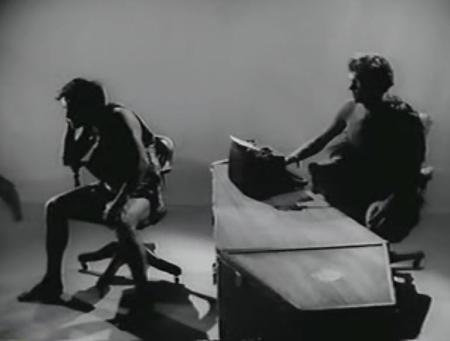
Passages from Finnegans Wake
1965-67
ubu
Duration: 90 min
Directed by Mary Ellen Bute
Screenplay by Mary Manning
Cinematography by Ted Nemeth
Music by Elliot Kaplan
_______________________
The three-minute redemption
Hannu Väisänen
Translated by Hildi Hawkins
Books from Finland
Now I need to get another beat into my head. What can help me forget those morose, curled up creatures, their strange commands and scents? I remember the roller-coaster. And I remember the ancient lore that it’s good to ride the roller-coaster with a lover before you attempt anything else. I go home quickly, throw down my sketch-book and my unnecessarily businesslike briefcase, exchange my suit, which was supposed to indicate devotion, for a windcheater, arrange my hair more carelessly, get on my bike and cycle to the funfair where I know the roller-coaster, the genuine, real, old-fashioned, clanking roller-coaster, to be.
Who could have been the first person to imagine the delights of the roller-coaster? Into whose happy capacity for daydreaming did it fall? Who saw those massive iron tentacles in their figure-eight shapes, those stretched and knotted rings of eternal joy? Who understood that on such a ride shame and anxiety would fall out of one’s pockets? It’s claimed that the first roller-coaster was invented by Catherine the Great. The monarch, with her multifarious patronage of culture, commissioned in Oranienbaum, St Petersburg, the first Montagne Russe amid the amusements of the wise: a Russian mountain with its ice-paths, raised into the air, which melted with the coming of spring. Who else could understand this organ-stirring amusement as deeply as the Great Wife with her hundreds of lovers. In the grip of mortal fear, I too always pray: before I am laid in earth, before the crematorium’s oven, take me once more to the roller-coaster....(more)
_______________________

The Channel At Gravelines
Evening
Georges Seurat
_______________________
Where Will the World's Poor Live?
An Update on Global Poverty and the New Bottom Billion
Andy Sumner
Abstract:
This paper updates the distribution of global poverty data and makes projections up to 2020. The paper asks the following question: Do the world’s extreme poor live in poor countries? It is argued that many of the world’s extreme poor already live in countries where the total cost of ending extreme poverty is not prohibitively high as a percentage of GDP. And in the not-too-distant future, most of the world’s poor will live in countries that do have the domestic financial scope to end at least extreme poverty. This would imply a reframing of global poverty as largely a matter of domestic distribution.
The Buoyant Billions: How 'Middle Class' are the New Middle Classes in Developing Countries? (And Why Does it Matter?)
Andy Sumner
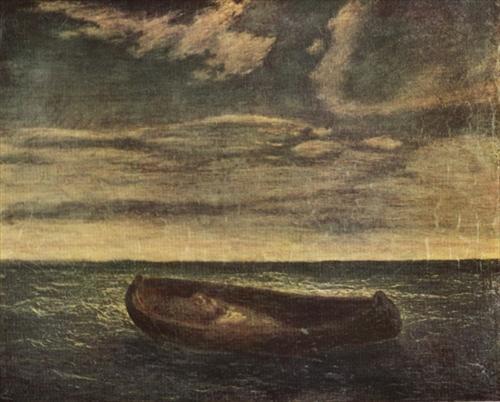 Constance
1896
Albert Pinkham Ryder
And Constance have they taken now, hot-foot,
And on a ship, of rudder destitute
Geoffrey Chaucer, The Lawyer's Tale
_______________________
the 23rd Addenda.
Watt will not
abate one jot
but of what
of the coming to
of the being at
of the going from
Knott’s habitat
of the long way
of the short stay
of the going back home
the way he had come
of the empty heart
of the empty hands
of the dim mind wayfaring
through barren lands
of a flame with dark winds
hedged about
going out
gone out
of the empty heart
of the empty hands
of the dark mind stumbling
through barren lands
that is of what
Watt will not
abate one jot
Samuel Beckett reads from Watt
1965
open culture
_______________________
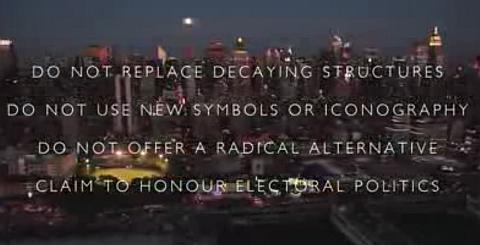
'Obey'
Film Based on Chris Hedges' 'Death of the Liberal Class'
Temujin Doran
youtube
_______________________
Apologists for Power
William Davies reviews Economists and the Powerful: Convenient Theories, Distorted Facts, Ample Rewards, by Norbert Häring & Niall Douglas.
One of the gratifying aspects of a major financial crisis is that public understanding of capitalism, as distinct from just ‘markets’, increases significantly. Prior to 2008, one would have been hard-pressed to find a discussion of where money comes from, or the relationship between central banks and the rest of the financial system, beyond the pages of obscure – and professionally marginalised – journals of heterodox economics. Marxist analyses of the state have always assumed that governments and theorists act in alliance with particular class and industrial interests; but this analysis was often too bound up in its own theoretical abstractions or political radicalism to penetrate the broader public consciousness.
What has been interesting to watch over the past five years has been the unwitting discovery of heterodox and Marxist insights by relatively mainstream scholars, intellectuals and activists, who otherwise associated Marx with totalitarianism and had never heard of Hyman Minsky. Yet, rather than a systemic critique of ‘capitalism’, ‘neoliberalism’ or ‘financialisation’, there is more often the sense of a conspiracy being exposed. The 2010 movie, Inside Job, gave a frightening insight into the rigging of the financial system, by a small coterie of American elites. Books such as Winner-take-all Politics by Jacob Hacker and Paul Pierson revealed how US government policy led directly, often deliberately, to extreme concentrations of wealth.
Economists and the Powerful performs another valuable unmasking act, this time of the surreal misrepresentations of capitalism, as proffered by mainstream economic theory. Beginning with an account of how economics was cleansed of any theory of power during the ‘marginal revolution’ of the 1870s, it goes on to show how it is consequently unable to account for what actually takes place in settings such as large financial institutions, corporate boardrooms, workplaces and even markets themselves....(more)
_______________________
Speculations On The Stationary State
Gopal Balakrishnan
(....)
Of course, the recurring crises of capitalism are supposed to be different from the terminal stages of non-capitalist civilizations and modes of production. Such social orders seem to have lacked capitalism’s distinctive capacity for creative destruction, for periodic renewal through downturns that liquidate inefficient conditions of production and life forms, opening up frontiers for the next round of expansion. In accordance with this pattern, nearly all commentators on today’s economic meltdown have assumed that this Schumpeterian tale of crisis and renovation will repeat itself in one form or another. But is it, in fact, inevitable that new phases of accumulation will emerge from the aftermath of what now promises to be an enormous and protracted shake-out? I would like to propose that this scenario of capitalist renewal is distinctly less likely than a long-term drift towards what the classical political economists used to call ‘the stationary state’ of civilization.
(....)
We are entering into a period of inconclusive struggles between a weakened capitalism and dispersed agencies of opposition, within delegitimated and insolvent political orders. The end of history could be thought to begin when no project of global scope is left standing, and a new kind of ‘worldlessness’ and drift begins. This would conform to Hegel’s suspicion that at this spiritual terminus, the past would be known, but that a singular future might cease to be a relevant category. In the absence of organized political projects to build new forms of autonomous life, the ongoing crisis will be stalked by ecological fatalities that will not be evaded by faltering growth. An observation from Fredric Jameson at the onset of this age of capitalism still frames the present:
Confusion about the future of capitalism—compounded by a confidence in technological progress beclouded by intermittent certainties of catastrophe and disaster—is at least as old as the late nineteenth century; but few periods have proved as incapable of framing immediate alternatives for themselves, let alone of imagining those great Utopias that have occasionally broken on the status quo like a sunburst. ...(more)
_______________________
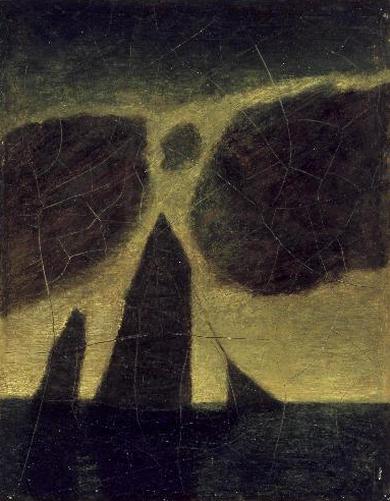
Marine
c. 1890
Albert Pinkham Ryder
d. March 28, 1917
_______________________
Writing, Ideology & Mass Communication In Techno-Industrial Society
Nihilo Zero
by N. Zero
_______________________
Privatization and Protest: Occupy Wall Street, Occupy Toronto, and the Occupation of Public Space in a Democracy
Margaret Kohn
Perspectives on Politics
Volume 11 / Issue 01 / March 2013
Abstract
This article examines the legal and normative debates about the Occupy Toronto movement in order to illuminate the issues raised by Occupy Wall Street. It challenges the view that the occupation of parks and plazas was an illegitimate privatization of public space. In both New York City and Toronto, the courts relied on a theory that Habermas called "German Hobbesianism." This sovereigntist theory of the public was used to justify removing the protesters and disbanding the encampments. The alternative is what I call the populist model of the public, a term which describes the political mobilization of the people outside the institutional structures of the state. While my focus is on public space, I suggest the appropriation of space was the most visible aspect of a broader call for collective control of the common wealth of society. In other words, we should understand the occupations synecdochally as struggles over the meaning and power of public and private.
_______________________
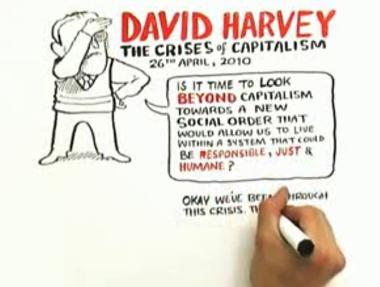
Crises of Capitalism
RSA Animate
David Harvey looks beyond capitalism towards a new social order.
via Michael Benton
_______________________
Tidal: Occupy Theory, Occupy Strategy
issue 4 - Block By Block
February 2013
_______________________

“Drummer’s Book”
ceramic stoneware and rusted steel
Sir Anthony Caro
_______________________
Wittgenstein's Collection of Nonsense
discussing Ludwig Wittgenstein - philosopher, millionaire, pauper, aeronautical engineer - his life, ideas and attitude to human progress
Jonathan Rée
How The Light Gets In, the philosophy and art fringe festival in May at Hay on Wye
_______________________
Spring
Mario Rigoni Stern
Translated from Italian by Gregory Conti
words without borders
The departure came in the month of March, when the thaw opened up the passes, which in our mountains were like gateways toward the countries of central Europe. They would go on foot, with the tools of their trades in a sack slung over their shoulders with two pieces of rope, or with the other essentials in a wheelbarrow that they pushed along. That's how our mountaineers started on their way to Prussia, Austria or Bohemia to work in exchange for marks or coronas which then gave them the opportunity to spend the winters with their families.
...(more)
_______________________

photo - mw

Four Men in Boat
1900
Glass Negative Series
1900-1939
International Harvester
Wisconsin Historical Society
>via
_______________________
“To show the fly the way out of the fly bottle ”
Wittgenstein
Of Flies and Philosophers: Wittgenstein and Philosophy
Michael P. Lynch responds to Was Wittgenstein Right?, Paul Horwich
(....)
I think philosophy can play a more radical role. Return to our fly. Wittgenstein was not the first to compare the philosopher to one, nor the most famous. That award goes to Socrates, who claimed that the role of the philosopher was to act as a gadfly to the state. This is a very different metaphor. Leaving the world as it is isn’t what gadflies do. They bite. As I see it, so can philosophers: they not only describe how we think, they get us to change our way of thinking — and sometimes our ways of acting. Philosophy is not just descriptive: it is normative.
(....)
Philosophy is not science. Knowing how we ordinarily use our concepts of truth, or personhood or causation is important. Wittgenstein was certainly right that philosophers get into muddles by ignoring these facts. Yet even when it comes to the abstract concerns of metaphysics, philosophy can and should aspire to be more than just a description of the ordinary. That is because sometimes the ordinary is mistaken. Sometimes it is the familiar from which we need liberating — in part because our ordinary concepts themselves have a history, a history that is shaped in part by certain metaphysical assumptions.
Consider the idea that the real essence of truth is Authority — that is, what is true is whatever God, or the King or The Party commands or accepts. This is a reductive definition, one that still lurks in the background of many people’s worldviews. It has also been used over the centuries to stifle dissent and change. In order to free us from these sorts of thoughts, the philosopher must not only show the error in such definitions. She must also take conceptual leaps. She must aim at revision as much as description, and sketch new metaphysical theories, replacing old explanations with new. She must risk the fly bottle....(more)
_______________________

photo - mw
_______________________
Don't Let the Dream of Open Access Journals Die
Puneet Opal
(....)
Open access is necessary for true science outreach that can really push society intellectually forward. It will be easier for everyone to access the primary literature, and it will be more difficult to talk of conspiracy theories when the data is for all to see and evaluate. Of course, there will be debates, but these will now revolve around the quality and interpretation of the evidence with more in-depth analyses.
The debates and general ferment will raise the level of scientific discourse that we academics so often complain about, and, who knows, this sort of thoughtfulness might well spill over into just about everything we do. In short, one might argue against Aaron Swartz's means, but it is difficult to argue with the end that he was fighting for.
...(more)
_______________________
The Price of Innovation - my Thoughts for Beyond the PDF
Martin Fenner
How to pay for the development of new scientific infrastructure and tools is something that I think a lot about science moving away from academia to become a developer of scientific software last year. I would assume three things:
there are a lot of great ideas out there to improve scholarly communication
there is enough money out there to pay for improvements in scholarly communication
we are frustrated because progress is much slower than we anticipate
If we have enough great ideas and enough money, but don't see the results we expect, something must be going wrong. A simple answer would be that it is different people and organizations that have the ideas from those that have the money, but I don't think that this is the reason. My suspicion is that there is a deeper problem, and that the approach we take to scholarly innovation is broken....(more)
Beyond the PDF Conference Amsterdam
PLOS Blogs
The Public Library of Science
_______________________

Factory near Water
1900
Glass Negative Series
1900-1939
International Harvester
Wisconsin Historical Society
_______________________
We Built This City: Detropia and Cruel Optimism
Meagan Day
Full Stop
Our fantasies are fraying. In her book Cruel Optimism, Lauren Berlant enumerates them – “upward mobility, job security… meritocracy, the sense that liberal-capitalist society will reliably provide opportunities for individuals to carve out relations of reciprocity that seem fair.” Without these fantasies we’re like Wile E. Coyote after he runs off the cliff, treading on thin air, growing suspicious but remaining momentarily aloft. Whether we’ll land on our feet (and surely some of us will land better than others) remains to be seen. In the meantime, “there are no guarantees that the life one intends can or will be built.”
The privatization of public institutions, the deterioration of social welfare programs, the unpredictability of global markets and mass domestic pay-cuts and layoffs have reduced millions of Americans’ plans to uncertain daydreams. Berlant writes of “the increasing corrosion of security as a condition of life for workers across different concentrations of economic and political privilege,” which is to say that precarity is no longer reserved for the hyper-vulnerable poor. From the aspiring middle class to the hubristic nouveau riche, people along the socioeconomic spectrum are exposed to growing financial risk and diminishing protective structures. And no major city in America knows the consequences of this vicious combination better than Detroit.
The 2012 film Detropia, directed by Rachel Grady and Heidi Ewing, meditates on this creeping precarity, echoing Berlant along the way. ...(more)
_______________________

photo - mw
_______________________
Yard
Collected by John Latta
I’ve known a Heaven, like a Tent—
To wrap its shining Yards—
Pluck up its stakes, and disappear—
Without the sound of Boards
Or Rip of Nail Or Carpenter—
But just the miles of Stare—
That signalize a Show’s Retreat—
In North America—
— Emily Dickinson, out of “#243” (The Complete Poems of Emily Dickinson, 1960)
All this with many mulctings of the man,
Effective colonizer sharply stopped
In the door-yard by his own capacious bloom.
But that this bloom grown riper, showing nibs
Of its eventual roundness, puerile tints
Of spiced and weathery rouges, should complex
The stopper to indulgent fatalist
Was unforeseen.
— Wallace Stevens, out of “The Comedian as the Letter C”
...(more)
_______________________
What Is the Business of Literature?
Richard Nash
Virginia Quarterly Review
One of the remarkable deficits in contemporary accounts of both book publishing and Internet business is sociohistorical awareness. That it should be so with the Internet is unsurprising, prone as so many popular tech commentators are to triumphalist or progressive teleologies—
(....)
The story of the book as technology—the book as revolutionary, disruptive technology—must be told honestly, without triumphalism or defeatism, without hope, without despair, just as Isak Dinesen admonished us to write. A great challenge in producing such an account, however, is the “availability heuristic.” This is a model of cognitive psychology first proposed in 1973 by Nobel laureate Daniel Kahneman and his colleague Amos Tversky, which describes how humans make decisions based on information that is relatively easy to recall. The things that we easily recall are things that happen frequently, and so making decisions based on the samples we have at hand would seem to make sense. The sun rises every day; we infer from this that the sun rises every day. A turkey is fed every day; it infers that it will be fed every day—until, suddenly, it isn’t. Heuristics are great until they aren’t. A person sees several news stories of cats leaping out of tall trees and surviving, so he believes that cats must be robust to long falls. These kinds of news reports are far more prevalent than ones where a cat falls to its death, which is the more common event. But since it is less reported on, it is not readily available to a person for him to make judgments. ...(more)
_______________________
Elegiac Feelings American
for the dear memory of Jack Kerouac
Gregory Corso
(....)
... The American
alien in America is a bitter truncation; and even
this elegy, dear Jack, shall have a butchered
tree, a tree beaten to a pulp, upon which it'll be
contained—no wonder no good news can be
written on such bad news—
How alien the natural home, aye, aye, how dies the tree when
the ground is foreign, cold, unfree—The winds
know not to blow the seed of the Redwood where
none before stood; no palm is blown to Oregon,
how wise the wind—Wise
too the senders of the prophet. . . knowing the
fertility of the designated spot where suchmeant
prophecy be announced and answerable—the
sower of wheat does not sow in the fields of cane;
for the sender of the voice did also send the ear.
And were little Liechtenstein, and not America, the
designation. . . surely then we'd the tongues of
Liechtenstein—
Was not so much our finding America as it was America finding
its voice in us; many spoke to America as though
America by land-right was theirs by law-right
legislatively acquired by materialistic coups of
wealth and inheritance; like the citizen of society
believes himself the owner of society, and what he
makes of himself he makes of America and thus when
he speaks of America he speaks of himself, and quite
often such a he is duly elected to represent what he
represents. . . an infernal ego of an America
...(more)

Gregory Corso
b. March 26, 1930
Gregory Corso, his attic room 9 Rue Git-le-Coeur
photo - Allen Ginsberg
The Happy Birthday of Death
Gregory Corso
google books
Herald of the Autochthonic Spirit
Gregory Corso
google books
Corso videos
_______________________
Three Poems by Paul Celan from Snowpart
Translated & annotated by Pierre Joris
presented by Jerome Rothenberg
A LEAF, treeless,
for Bertold Brecht:
What times are these
when a conversation
is nearly a crime,
because it includes
so much being spoken.
...(more)
_______________________

photo - mw
_______________________
Ham Sandwich Nation: Due Process When Everything is a Crime
Glenn Harlan Reynolds
Abstract:
Though extensive due process protections apply to the investigation of crimes, and to criminal trials, perhaps the most important part of the criminal process -- the decision whether to charge a defendant, and with what -- is almost entirely discretionary. Given the plethora of criminal laws and regulations in today's society, this due process gap allows prosecutors to charge almost anyone they take a deep interest in. This Essay discusses the problem in the context of recent prosecutorial controversies involving the cases of Aaron Swartz and David Gregory, and offers some suggested remedies, along with a call for further discussion.
_______________________

Monique Jacot

Digital Collages of People Climbing Stairs
Jiyen Lee
_______________________
Sleepwalking Towards Bethlehem
Jason Mcbride
Hazlitt
Some thoughts on the first paragraph of Renata Adler's just reissued 1976 novel Speedboat.
Nobody died that year. Nobody prospered. There were no births or marriages. Seventeen reverent satires were written-disrupting a cliché and, presumably, creating a genre. That was a dream, of course, but many of the most important things, I find, are the ones learned in your sleep. Speech, tennis, music, skiing, manners, love-you try them waking and perhaps balk at the jump, and then you're over. You've caught the rhythm of them once and for all, in your sleep at night. The city, of course, can wreck it. So much insomnia. So many rhythms collide. The salesgirl, the landlord, the guests, the bystanders, sixteen varieties of social circumstance in a day. Everyone has the power to call your whole life into question here. Too many people have access to your state of mind. Some people are indifferent to dislike, even relish it. Hardly anyone I know.
It's one of the strangest, most elegant openings in contemporary American literature, as perfect and precise as the beginning of Lolita, The Adventures of Augie March or Guide. In these fifteen sentences, you can hear whispers of Woolf, Dickens, Camus, Proust, but in its astringent comedy and ruthless compression, it's all nouveau roman....(more)
_______________________
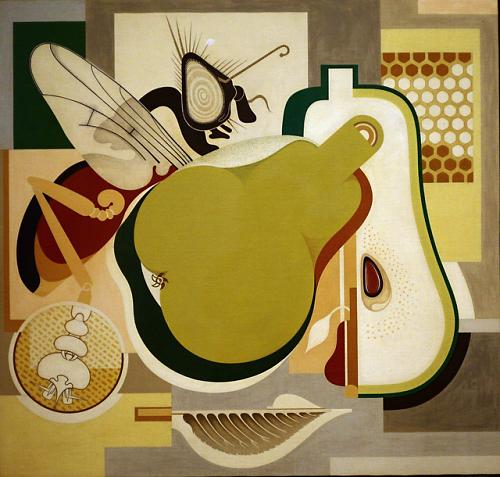
Wasp and Pear
Gerald Murphy
1929
_______________________
there’s also flat-painted lamentation,
Friederike Mayröcker
Translated from the German by Richard Dove
for Jackson Mac Low on his 75th birthday
the deep
pear-gorge that is
scent of pear-trees from the depths
of memory has elicited
something like SENSATION : feeling
of deep childhood from me: with hanging-down
branches of the two pear-trees in front of the gate
painted green, rubbing the pear-trees’ leaves between the finger-tips
of my left hand, that long
this veiled childhood
wafts in the singing of evenings that the yellow / the
sun which summons up the bee – the bepeared boughs
again and again . .
while the barberry-lock of past summers
swarms into my blood,
a barberry horizon storms through my blood with
a sky that’s frowning suddenly
sultanas wearing shoes chary flying
sunshades and pennants
poems
Friederike Mayröcker
Green Integer Review
_______________________
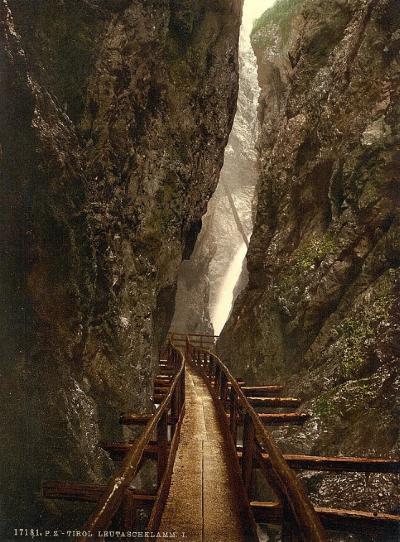
Photochromosomes
50watts
_______________________
The Lists of W. G. Sebald
Tom McInnes Lee
(....)
In this article I focus on what is perhaps Sebald’s prototypical work, The Rings of Saturn. Of all Sebald’s prose fictional works The Rings of Saturn seems the example that best exhibits his innovative literary forms, including the use of lists. This book is the work of an author who is purposefully and imaginatively concerned with the nature of his vocation: what is it to be a writer? Crucially, he addresses this question not only from the perspective of a subject facing an existential crisis, but from the perspective of the documents created by writers. His works demonstrate a concern with the enabling role documents play in the thinking and writing process; how, for example, pen and paper are looped in with our capacity to reason in certain ways. Despite taking the form of fictional narratives, his books are as much motivated by a historical interest in how ideas and forms of organisation are transmitted, and how they evolve as part of an ecology; how humans become articulate within their surrounds, according to the contingencies of specific epochs and places. The Sebald critic J. J. Long accounts for this in some part in his description “archival consciousness,” which recommends that conscious experience is not simply located in the mind of a knowing, human subject, but is rather distributed between the subject and different technologies (among which writing and archives are exemplary).
The most notable peculiarity of Sebald’s books lies in their abundant use of “non-syntactical” kinds of writing or inscription. My use of the term “non-syntactical” has its origins in the anthropological work of Jack Goody, who emphasises the importance of list making and tabulation in pre-literate or barely literate cultures. In Sebald’s texts, kinds of non-syntactical writing include lists, photographic images, tables, signatures, diagrams, maps, stamps, dockets and sketches. As I stress throughout this article, Sebald’s shifts between syntactical and non-syntactical forms of writing allows him to build up highly complex schemes of internal reference. Massimo Leone identifies something similar, when he notes that Sebald “orchestrates a multiplicity of voices and text-types in order to produce his own coherent discourse”. The play between multiplicity and coherence is at once a thematic and poetic concern for Sebald. This is to say, his texts are formal experiments with these contrasting tendencies, in addition to discussing specific historical situations in which they feature.
The list is perhaps Sebald’s most widely used and variable form of non-syntactical writing, a key part of his formal and stylistic peculiarity. His lengthy sentences frequently spill over into catalogues and inventories, and the entire structure of his narratives is list-like. Discrete episodes accumulate alongside each other, rather than following a narrative arc where episodes of suspenseful gravity overshadow the significance of minor events. ...(more)
'list'
M/C Vol. 15, No. 5 (2012)
Listlessness in the Archive
Ben Highmore
(....)
The task of making lists, of filling-in lists, of having a list of tasks to complete encourages listlessness because to list lists towards exhaustiveness and exhaustion. Archives are lists and lists are often archives and archived. Those that work on lists and on archives constantly battle the fatigue of too many lists, of too much exhaustiveness. But could exhaustion be embraced as a necessary mood with which to deal with lists and archives? Might listlessness be something of a methodological orientation that has its own productivity in the face of so many lists?...(more)
_______________________
 From the series
Circulation: Date, Place, Events
Takuma Nakahira
Yossi Milo Gallery
via
“A Portrait of Takuma Nakahira”
Masashi Kohara
(2005)
Translation: Richard Watts
American Suburb X
_______________________
In Praise Of Inconsistency [pdf]
Leszek Kolakowski
Translated by I. A. Langnas and Ann Rosenhaft
Dissent Vol. 11, April 1964, No. 2
(....)
Inconsistency is simply a hidden awareness of the contradictions of this world. When I mention contradictions, I refer to the well-known historical fact that different kinds of social values have often been introduced into a society by antagonistic forces. If it were universally held that certain values were absolutely and exclusively true and that everything must yield to them, humanity would become an ever-expanding battlefield—which, incidentally, has happened every now and then. In so far as inconsistency is an individual attitude, it is nothing but a collection of uncertainties which conscience keeps in reserve, a continuous awareness that one may well be mistaken or that the enemy may be right. We have in mind here the relations between thought and principle on the one hand and practical behavior on the other. Now of course every thought which is an operative factor in human behavior is the affirmation of a social value. But the world of social values, unlike the world of theory, is not a world of two-value logic. This is one of the chief principles we wish to formulate. Or, in other words, there exist values that are mutually exclusive without ceasing to be values, whereas truths cannot be mutually exclusive without ceasing to be truths. We have the evidence of daily life that this is so. Inconsistency, as we define it here, is simply the refusal, once and for all, to make a choice for all future time between two mutually exclusive values.
To become clearly aware of this permanent situation and this antinomy of the world of values is merely to become consciously inconsistent. Indeed, inconsistency is usually practiced rather than proclaimed. Inconsistency is a constant attempt to cheat an existence which always presents us with alternatives; which places us between two doors of which each is only an entry and neither is an exit, and once we have entered one door we must ceaselessly fight anyone who has entered the other until we have nothing left to fight with, until we die. And so we try to scheme, to maneuver, to employ all kinds of strategems and subterfuges, underhanded tricks and ruses, escapes and refusals, detours, half-truths and discretions, in order not to be pushed into one of the doors which open in only one direction. This way of cheating existence, these attempts to conciliate incurable antagonisms, to avoid the terrible čither-or's" between contradictory values—all this is not the consequence of a temporary disorder in the course of a lifetime which will disappear with the coming of a new era. No, it is the consequence, the product of the human condition and its antinomies which are always with us.
We can avoid these antinomies by inconsistency. We can accept them as part of man's fate in order that one precious value may not be denied us merely because another equally precious value is in constant opposition to it. We therefore try to delay making final choices, until we are surprised by death—the only situation where there really is no choice.
(....) _______________________

Cocktail
1927
Gerald Murphy
b. March 25, 1888
_______________________
Habitable sentences of the poet's novel
Laynie Browne
jacket2
(....)
What is it about the sentence that encourages one to stretch out?
Is attraction to the sentence part of the appealing lure of the poet’s novel? Are there some novels which do not function at the level of the sentence? More likely there are novels with hybrid or visualized moments, pages, chapters or asides which function at the level of the word, phrase, or repetition of a particular sentence to the point that text becomes an invocation or mandala, challenging how many ways one may read....(more)

Fukurokuju Writing with His Head
Tsukioka Yoshitoshi
(1839-1892)
via
The Public Domain Review
_______________________
Lars, W. and Badiou
excerpt from Exodus, Lars Iyer
The conference dinner. Alain Badiou, sitting all alone.
Why don’t we ask to join him? Why don’t we introduce ourselves, and sit down beside him? W. could speak in his soft French, and I could fetch a bottle of wine and some glasses.
We could lament the fatuity of what passes itself off as ethics in both public discourse and the university, and analyse the supplanting of real philosophy by so-called applied ethics (badminton ethics). We could mull over the origin of the great French philosophy of the ‘60s, and the decline of Critical Theory since the ‘60s.
(....)
... what would Alain Badiou make of us? What would he conclude? Enemies, he would think. No, not even that, Badiou would think. – ‘Pas enemies. Les tosseurs’. But perhaps he wouldn't think anything at all. Perhaps he'd just look through us, as if, as with evil for Plato, we didn't really exist.
For the mathematical philosopher, vagueness doesn't exist, not really; it's only a deficiency of precision. And pathos doesn't exist for the political philosopher, not unless it is the glint of starlight, impersonal and remote, on the eyeglasses of the militant, brick in hand, charging the police.
...(more)
_______________________
What Is and What Could Be:
Hank Mobley
Aaron Gilbreath
conjunctions
(....)
In 1979, at age forty-nine, Mobley told journalist John Litweiler, “It’s hard for me to think of what could be and what should have been. I lived with Charlie Parker, Bud Powell, Thelonious Monk; I walked with them up and down the street. I did not know what it meant when I listened to them cry—until it happened to me.”
The first time I read these sentences, they filled me with gloom. The thought of one of my favorite tenors suffering enough to cry left me grieving into the night. It also raised the question: What happened to Mobley?
What “should have been”—should have. Should. “Should” is the language of outcomes. The word suggests a blueprint of the mechanics behind fate, about our conceptions of fairness, providence, and stakes, as well as a person’s expectations, not just what we’re entitled to, but how much we believe in the American value of “hard work + time = rewards & improvement.” In its grandest application, “should” can suggest the inner workings of cosmic justice, what the universe owes you—reward for effort, reward for morality, Karmic recompense. Here, the word delivers news of destiny undelivered. What Mobley thought should have happened did not. Instead, he got something else, something that seems to have challenged his worldview and suffused it with some amount of regret.
...(more)
_______________________

Ease Your Thoughts to Give Up
Jon Pylypchuk
(known as Rudy Bust)
2001
20,000 images
The Los Angeles County Museum of Art
_______________________
Talking with George Saunders
Robert Birnbaum
our man in boston
(....)
GS: As you write book one, you write it from a certain place, and as you do that you learn certain things that then inflect you differently on book two and three and so on. So my experience has been that it all has had very little to do with intentionality. It’s more instinctual. It’s funny, when a book comes out people will say things, positive or negative, assuming that you planned it, that you meant it, or thought it out in advance or whatever. They credit the writer with some combination of intentionality and design and certainty. I feel like when you are writing it’s much more from the seat of the pants. You’re just trying to get it to cohere, and almost as soon as you conceive of the idea you realize that it’s got this defect, or defects, so you are trying to find a counter-balance. It’s like plate-spinning. And at the end, kind of in the spirit of coming out of a fight, you go, “Ha, wow, that’s done.” But it’s not like you very confidently say, “Hooray, I produced this wonderful work of art, of which I am entirely sure.” It’s more like, “Wow, shit, that was confusing.” But it’s as good as you can get it and it goes out into the world and people say things that imply that artist is in control and is making a statement. I kind of laugh because it doesn’t feel like that at all.
...(more)
_______________________

Tźte cristallisé
1942
Jacques Hérold
1910 - 1987
_______________________
Recantorium [pdf]
(a bachelor machine, after Duchamp after Kafka)
trilingual edition from Gammm
Charles Bernstein
(....)
I was wrong, I apologize, I recant. I altogether reject, abjure, and denounce the sarcasm that
just now has undercut the sincerity of my confession. My comments about poets as retarded or
crippled stepchildren are offensive. I abase and prostrate myself in humbly and sincerely asking
your forgiveness and the forgiveness of all those who seek, above all, sincerity and authenticity in
poetry.
I was wrong, I apologize, I recant. Midway in my journey as a poet, I have given my name in
encomium and book cover endorsement, both for ads and announcements, catalogs and brochures, print and digital, to works that are not of the highest order as established by Time, Authority, and Fashion, lapsing into stubborn selection based on personal preference or appreciation or liking, on intuitions and hunches, rather than rational principle and promulgated theory.
I was wrong, I apologize, I recant. I altogether abandon and renounce the false opinion that
poetry is a social and ideological construction and not the expression of the Pure Feeling of the
Poet (PFP) and declare the Sovereign Human Self (SHS) is the sole origin of authentic expression and meaning. In full recognition and acknowledgement of my error, I hereby declare and
swear, to all present company, that I must not hold, defend, or teach in any way whatsoever,
verbally or in writing, the said false doctrine.
(....) E-books at G A M M M
_______________________
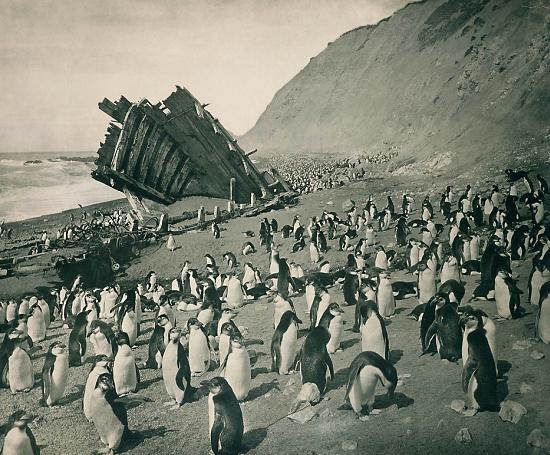
Wreck of the Gratitude
Macquarie Island
photographer unknown, 1911
from First Australasian Antarctic Expedition (1911-1914)
(State Library of New South Wales)
State Library of New South Wales collection's photostream
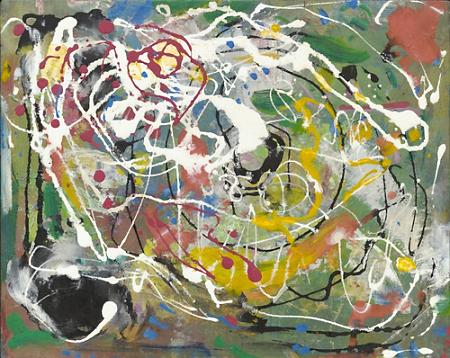
Spring
1944-45
Hans Hofmann
b. March 21, 1880
_______________________
‘this is the kind of poetry we want’: Raymond Souster’s Editorial Legacy
Cameron Anstee
I am a firm believer that one must make an effort to document, understand, and contest that which came before in an artistic community. In the context of Canadian poetry, Raymond Souster is, to my mind, the towering figure of our previous century. The structures of publishing, organizing, and community building that operate today, that give us a productive and varied literary publishing community, can be traced to Souster in the 1940s, 50s, and 60s, yet he remains known primarily, reductively, as a ‘poet of content’, a one - time winner of the Governor General’s Award in 1964, and a poet who spent his life working in a bank. We are here today to raise money for a poetry festival that grows out of a set of poetry reading series in the city, a festival that cite s one its key objectives as being to create connections between the so - called ‘stage’ and ‘page’ communities, a festival that broadened its horizons to include International poets in only its second year. The modern poetry reading series does not exist in Canada without Souster in the 1950s. I think that VERSeFest in part reflects an ethic that Raymond Souster built into the foundations of modern poetry in this country. above/ground press and The Factory Reading Series are similarly a part of this history. I think it is only appropriate today to attempt to come to terms with even a fraction of this crucially important editorial work. Raymond Souster died on October 19, 2012 at the age of 91. Following his death, my dad described Souster’s life as one of “right work.” That is what I intend to discuss today.
17 seconds,
( : a journal of poetry and poetics )
edited by rob mclennan Sixth Issue: Winter 2013 [pdf]
Raymond Souster
1921 - 2012 Souster poems at Representative Poetry Onlinea web anthology of 4,800 poems in English and French by over 700 poets spanning 1400 years _______________________

Grand Canyon, Arizona
1971
Kenneth Josephson: In Retrospect
Charles A. Hartman Fine Art
via
_______________________
Climate deniers and the cycle of abuse
Derrick Jensen
Orion
(....)
I first learned about the stages of denial from trauma expert Judith Herman, who said, “Whether it’s genocide, military aggression, rape, wife beating, or child abuse, the same dynamic plays itself out.” It begins, she says, “with an indignant, almost rageful denial.” Where global warming is concerned, there is plenty of rage, but, strangely, hardly any of it is directed at civilization or captains of industry for causing the warming that is contributing to the murder of the planet. Instead, it is primarily felt by those who deny that global warming is taking place, and is aimed at those who provide evidence counter to their denial.
(....)
Judith Herman’s articulation of this pattern has helped me recognize the maddening comments of climate deniers for what they are: a script more or less followed by most abusers. It’s imperative that we recognize and call out this pattern. So long as we don’t, we allow the abusers to choose the rhetorical field of battle. And instead of talking about what is to be done to stop this or that atrocity, we are stuck insisting that the atrocity is happening at all, that we aren’t crazy, or lying, or so on. The perpetrators thus keep us on the defensive. And no matter what proof we provide, they will never listen. Because the purpose was never to gain understanding, or even to debate: the purpose was, from the first to the last, to obfuscate, so that they can continue to exploit.
...(more)
_______________________
The challenges of corruption and the attainment of vision 20:2020
J. F. Adebisi
Abstract
Of late the focus and tenor of the fight against corruption has attracted renewed interest and come under fresh scrutiny as part of the broader good governance agenda. This is partly dud to increases in the incidence of corruption with impunity and mounting evidence about its negative multidimensional impact. The effect of corruption varies, depending on country conditions. It may, in the short term, even coexist with strong economic performance like (Chile, Asian Tigers). Its long-term effect, however, extends beyond actual revenue loss. This paper reflects on the economic effects of corruption in the attainment of Vision 20:2020. It is observed that the relate indirect effects include driving away investment, diminishing core democratic values, weakening the rule of law and credibility of pubic institutions, undermine consolidation of good governance and violate the social contract between citizens and the state. Furthermore, the findings showed that governance constraint, and corruption in particular, is a key determinant of a country’s global competitiveness. These findings challenge traditional notions of what constitutes the country’s investment climate,’ and who shapes it. This paper realizes that illegal forms of corruption would continue to be prevalent in the interaction between transnational of the rich world and the pubic sectors in many emerging countries.
Canadian Social Science Vol.9 No.1 February 28, 2013
_______________________
Canadian doctors launch court challenge of cuts to refugee health care
Redeye Collective
podcast
Last June, the federal government drastically cut health-care coverage for refugee claimants in Canada. Since then doctors have been unable to help hundreds of patients with treatable conditions. Last month, the organization Canadian Doctors for Refugee Care announced that they were pursuing a court challenge to the program cuts. Alexander Caudarella speaks with Redeye host Jane Williams.
Redeye 100.5FM
Redeye has been broadcasting every Saturday morning on Vancouver Cooperative Radio since the late 1970's.
_______________________

Delight
Hans Hofmann
1947
_______________________
Melancholy Watch, the Downs (September 1820)
Tom Clark
from Junkets on a Sad Planet: Scenes from the Life of John Keats, 1994
(....)
... now everything is
Only itself: the gulls, myself closer
In nature than if I still knew their name,
Yet at the same time moving farther out,
Sinking deeper into a fading sky
Which soaks them up like ink accepting water,
Coaxing darkness out of reluctant night,
Bringing on the abolition of that false
Identity which made naming possible.
...(more)
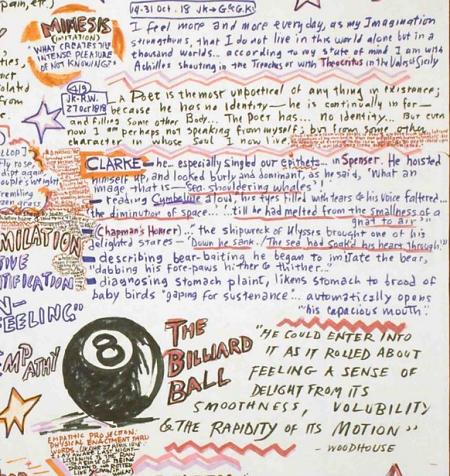 negative capability
detail
Deep Keats Scrolls: A Selection
Tom Clark
_______________________
The Devil's in the Details: What's Really Wrong with the LAC Code of Conduct
Myron Groover
The real danger is the insidious implication expressed by the Code as a whole that ALL civil liberties, in the workplace or out of it, are subject to oversight and approval by management. Repeatedly you see the document saying “it’s OK for you to have opinions…but it might not be if they’re about certain things. Best to check with your boss”. Even where these principles are pretty well attested in other departments’ Codes of Ethics it’s the heavy-handedness of the language and the implied universalisation of management oversight of employees’ personal lives that are truly sinister.
...(more)
Bibliocracymusings of an archivist / librarian. possibly deranged; definitely political via Mobylives
Library and Archives Canada’s “Code of Conduct”
_______________________
The Wisdom of the Ancients
Sebastian Agudelo
What country is this? blind Oedipus stumbles
at the threshold, on his way out, his last job.
You feel for him even if you’re neither old
nor blind, are just waking to the headlines.
What country? The neo-Nazi baby showers,
bbq’s with aging KKK’s, the munitions
stockpiled in some California basement
where, about right now, they’re lifting
prints, have handcuffed the ten year old
who shot his white supremacist dad.
What Country. And that’s just one instance
gone awry in the freak-show of grievance
and discontent, all very justified, if misguided.
In the morning paper, the mighty purse
their lips, so serious, so worried, so…
To stay the part they must re-run
Doomsday tsunamis in their heads,
imagine tax-havens going like Atlantis.
...(more)
Fogged Clarity - March/April 2013
_______________________
Legacy of an Iraq war veteran:
Tomas Young's anti-war message and decision to end his life
Amy Goodman
When asked how he wants to be remembered, Tomas Young replied: "That I fought as hard as I could to keep young men and women away from military service. I fought as hard as I could to keep another me from coming back to Iraq. That is what I want to be remembered for."
_______________________
The Iraq debate
Ten years after "shock and awe"
collected links at the Omnivore
_______________________

New Lectoure, France
Kenneth Josephson
2003
1 2 3
_______________________
Cassandra is 10
Congratulations and thanks for the years Beth - mw
Notes from
Language Hat, Maria Benet, and the Velveteen Rabbi

Toonerville Trolley in the Skagit
1921
Seattle Municipal Archives' photostream
h/t toTom Clark (Beyond The Pale)
_______________________
Night Notes, From Aprčs beaucoup d’années (‘Notes nocturnes’)
Philippe Jaccottet
Translation by C K Stead
(....)
The nighthawk
is the dark Fates’ spinning wheel.
For those of us remaining
the thread is short.
...(more)
Transitions, Series 3 Number 18
Modern Poetry in Translation
via The Page
_______________________
A Google Home Inspector Calls
On the Rise of the Doctrine of Compulsory Appearance
John Armitage
ctheory
... since the widespread introduction of socially networked teletechnologies as the "only possible way to invent new forms of social bond and civil peace" has as its unavoidable complement the compulsory appearance of all those who seek to remain among the disappeared, it can be argued that "telos" stands for the opposite of a grounding for embarking upon a hypercritique of socially networked teletechnologies.
(....)
... the hypermodern spirit of speed indicates in everyone touched by it a genuine detestation of disappearance, and of whatever appears to come relatively close to disappearance, in any and every field, inclusive of socially networked teletechnologies.
(....)
... the hypermodern attitude is constituted in such a way that it cannot endure any people who have never been online or even any who decide to stay among the disappeared. Because it does not know or understand the reasoning of such people, they come into view only as people who are "missing out" on "big consumer savings" set up for somebody else's profits in the attention economy.[35] Neither can the hypermodern mentality suffer any type of disappearance from zones ostensibly beyond the realm of socially networked teletechnologies, for example, disappearance from educational establishments.
(....)
Virilio offers a good example of such a horror of disappearance through a discussion of the current development of Google Earth and Google Maps, which, not surprisingly, and strictly consistent with the doctrine of compulsory appearance, aspire to visualize the whole of planet Earth....(more)
_______________________

stand the middle ground
Webster City, Iowa
Brendan Hoffman
via
_______________________
“Why I Am a Thief” by Mary MacLane
excerpt from “I Await the Devil’s Coming”
(....)
I have read some girl-books, a few years ago—“Hildegarde Grahame,” and “What Katy Did,” and all,—but I read them from afar. I looked at those creatures from behind a high board fence. I felt as if I had more tastes in common with the Jews wandering through the wilderness, or with a band of fighting Amazons. I am not a girl. I am a woman, of a kind. I began to be a woman at twelve, or more properly, a genius.
And then, usually, if one is not a girl one is a heroine—of the kind you read about. But I am not a heroine, either. A heroine is beautiful—eyes like the sea shoot opaque glances from under drooping lids—walks with undulating movements, her bright smile haunts one still, falls methodically in love with a man—always with a man, eats things (they are always called “viands”) with a delicate appetite, and on special occasions her voice is full of tears. I do none of these things. I am not beautiful. I do not walk with undulating movements—indeed, I have never seen any one walk so, except, perhaps, a cow that has been overfed. My bright smile haunts no one. I shoot no opaque glances from my eyes, which are not like the sea by any means. I have never eaten any viands, and my appetite for what I do eat is most excellent. And my voice has never yet, to my knowledge, been full of tears.
No, I am not a heroine.
...(more)
Mary MacLane’s I Await the Devil’s Coming is a shocking, brave and intellectually challenging diary of a 19-year-old girl living in Butte, Montana in 1902. Written in potent, raw prose that propelled the author to celebrity upon publication, the book has become almost completely forgotten.
In the early 20th century, MacLane’s name was synonymous with sexuality; she is widely hailed as being one of the earliest American feminist authors, and critics at the time praised her work for its daringly open and confessional style. In its first month of publication, the book sold 100,000 copies — a remarkable number for a debut author, and one that illustrates MacLane’s broad appeal.
Now, with a new introduction written by critic/blogger Jessa Crispin, I Await The Devil’s Coming stands poised to renew its reputation as one of America’s earliest and most powerful accounts of feminist thought and creativity.
publishers information
Melville House
Mary MacLane1881 — 1929
_______________________

"Parks, Pleasant Occasions, and Happiness"
video
1977
Seattle Municipal Archives
_______________________
Outing the Costs of Civil Deference to the Military
Elizabeth L. Hillman
Abstract:
Placing the costs and process of repeal into the framework of U.S. civil governance and military power reveals the faltering state of civilian control over, and understanding of, contemporary military institutions. The excessive delays, repetitive studies, and lack of judicial oversight that characterized the process of repeal expose a military unmoored from the constitutional and democratic constraints of civilian control. The end of Don’t Ask, Don’t Tell is more than a civil rights triumph. It is also a lesson in the steep costs and troubling consequences of excessive civilian deference to the armed forces.
_______________________
Last letter:
A message to George W. Bush and Dick Cheney from a dying Iraq War veteran
Tomas Young
(....)
I write this letter on behalf of husbands and wives who have lost spouses, on behalf of children who have lost a parent, on behalf of the fathers and mothers who have lost sons and daughters and on behalf of those who care for the many thousands of my fellow veterans who have brain injuries. I write this letter on behalf of those veterans whose trauma and self-revulsion for what they have witnessed, endured and done in Iraq have led to suicide and on behalf of the active-duty soldiers and Marines who commit, on average, a suicide a day. I write this letter on behalf of the some 1 million Iraqi dead and on behalf of the countless Iraqi wounded. I write this letter on behalf of us all -- the human detritus your war has left behind, those who will spend their lives in unending pain and grief.
I write this letter, my last letter, to you, Mr. Bush and Mr. Cheney. I write not because I think you grasp the terrible human and moral consequences of your lies, manipulation and thirst for wealth and power. I write this letter because, before my own death, I want to make it clear that I, and hundreds of thousands of my fellow veterans, along with millions of my fellow citizens, along with hundreds of millions more in Iraq and the Middle East, know fully who you are and what you have done. You may evade justice but in our eyes you are each guilty of egregious war crimes, of plunder and, finally, of murder, including the murder of thousands of young Americans -- my fellow veterans -- whose future you stole.
...(more)
10 years after Iraq invasion, new study tallies the massive toll of war
Rabble
On the tenth anniversary of the U.S. invasion of Iraq, we look at a massive new report by a team of 30 economists, anthropologists, political scientists, legal experts and physicians about the Iraq War's impact. "The Costs of War" report found the total number of people who have died from the Iraq War -- including soldiers, militants, police, contractors, journalists, humanitarian workers and Iraqi civilians -- has reached at least 189,000 people, including at least 123,000 civilians. Financially, the report estimates a cost to U.S. taxpayers of $2.2 trillion, a figure that could one day approach $4 trillion with the interest accrued on the borrowed money used to fund the war. We're joined by the report's co-author, Neta Crawford. professor of political science at Boston University.
_______________________
The State of the News Media 2013
Pew Research Center
_______________________
The GOP, Now With Less Crazy
The Republican plan to reform the party is less a program of reform than a rough blueprint about how to marginalize the nutters at the base.
David Weigel
_______________________

Bellevue ferry landing
1914
Seattle Municipal Archives
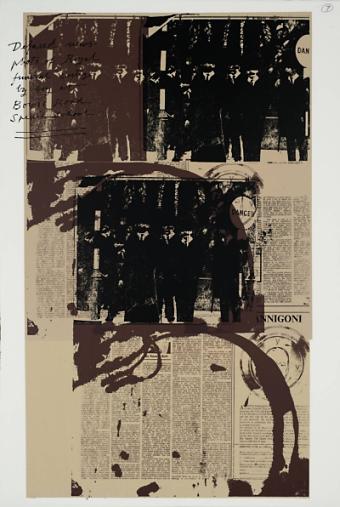
From Affirmations and Defacements
Michael Rothenstein
1976
_______________________
Contemporary politics is a devastating experiment that disarticulates and empties institutions and beliefs, ideologies and religions, identities and communities [only to reoffer them in] definitively nullified form.
Agamben, Means Without End
via
_______________________
Evidence for Democracy a new national non-partisan organization from the organizers of the Death of Evidence rally. We advocate for the transparent use of evidence in public policy and government decision making. Our official launch is coming soon. Please join our current campaign, Science: Uncensored, to stop the censoring and suppression of public science in Canada.
unmuzzledscience
Musings of A Canadian government scientist from behind the muzzle.
Canada's federal librarians fear being 'muzzled' Harper government’s reckless and undemocratic muzzling of scientists
Toronto Star Editorial
_______________________
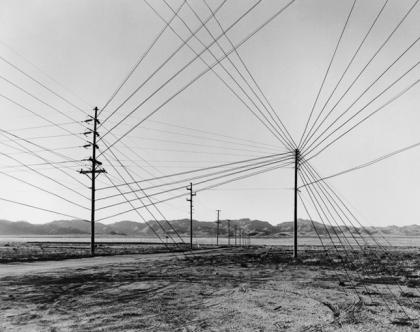
The Great Unreal
Taiyo Onorato & Nico Krebs
_______________________
I grew up in the future
Veronique Greenwood
aeon
(....)
But my mom is a futurist, that peculiar subclass of optimists who believe they can see the day after tomorrow coming. In the 1990s, she ordered pens customised with her consultancy name and the slogan: ‘Remember when we could only hear each other?’ Years later, when an unopened box of them surfaced in her office, she laughed and laughed. It would be another several years before Skype with video brought the rest of the world up to speed with her pens.
And by that point, she’d moved on.
It’s not always a particularly comfortable place to be, that knife’s edge between the next big thing and a truly embarrassing evolutionary dead-end. We were constantly wading through early models of doomed technology, and we dressed in, wrote with, and drank out of the detritus of wrecked start-ups. My dad’s favorite polo shirt memorialised a company that had not existed for at least a decade, and for toys we had stress balls and small plastic tops from telecom tradeshows. We had a massive TV-like device mounted with a swiveling webcam before which, at my mother’s behest, I played the clarinet for children gathered in a classroom thousands of miles away. I have not seen one of those in anyone’s living room lately.
...(more)
_______________________

In Between
1963
Michael Rothenstein
b. March 19, 1908
_______________________
Mitsu Hadeishi on digital and material worlds
synthetic zero
(....)
The world isn’t divided into the “real” and “virtual” any more than the introduction of radio or television divided the world into “real” and “on the air”. It’s introduced new channels for flows of information, and these flows have interesting, even radically new properties, but the existence of new flows doesn’t create a separate reality. We haven’t lived with these patterns of flows for very long, so they feel strange to us, and like every change they induce an instinctive counter-reaction; nostalgia for a past we are more familiar with, and a not entirely irrational fear that the change may introduce social, cultural, or physical phenomena into our lives which negatively impact our lives or destroy cherished features of the world we are replacing.
Bruce Sterling pointed this out quite poignantly in his always-funny and always trenchant SXSW closing talk: even as we change the world, even if in sometimes positive ways, we are simultaneously destroying parts of it. The internet hasn’t created a separate world but it has changed the world. Newspapers and bookstores are on their way out. Even things that came into being with the internet are getting paved over by later iterations of it, as the closing of Google Reader illustrates. The internet has facilitated and accelerated change, and it’s not always just for the better: what comes next rises over the ashes of what we’ve replaced. It’s worth thinking about what we might be losing as we move on, but the world hasn’t bifurcated, and there’s no “going back” to the “real” world — this is already the real world.
...(more)
_______________________

Black Mast, Dalmatian Sea
linocut
Michael Rothenstein
1958 _______________________
Seashell Sound
Stefan Helmreich
cabinet
(....)
Walter Benjamin played with the notion that shells contain worldly echoes, writing in the 1930s about his childhood around 1900: “Like a mollusk in its shell, I held my abode in the nineteenth century, which now lies hollow before me like an empty shell.” Imagining he could hold that century to his ear, he asked, “What do I hear?” answering,?
the brief clatter of the anthracite as it falls from the coal shuttle into a cast-iron stove, the dull pop of the flame as it ignites in the gas mantle, and the clinking of the lampshade on its brass ring when a vehicle passes by on the street. And other sounds as well, like the jingling of the basket of keys, or the ringing of the two bells at the front and back steps.
Robert Ryder suggests that, “what Benjamin hears in the conch are the primordial murmurings of the universe, but in the form of their smallest acoustical singularities.” This, argues Ryder, is the acoustical unconscious (or “un-conch-ious”). But Benjamin’s is also a moment in Euro-conchology in which shells concentrate memory by gathering the history of the vibrating world around them. We have the meeting of two models for seashell sound: a mythic model that has seashells as channels for voices from a communal past, and a materialist model that has seashells as resonant chambers of individual, located experience.
...(more)
_______________________
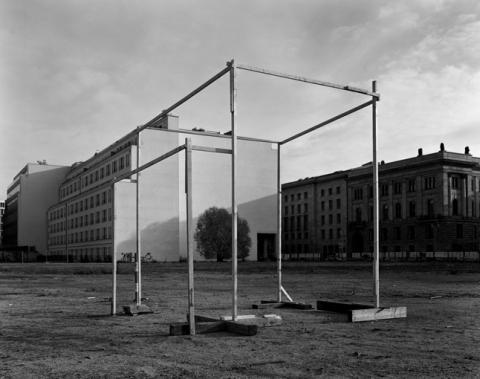
Potsdamer 1, 2010
Taiyo Onorato & Nico Krebs
_______________________
The Gaze
In Victorine Meurent, Manet found a model that examined the viewer, and thus Manet invented the modern art spectator.
By James Polchin
the smart set

waiting for spring
by the Ottawa River
photo - mw
_______________________
Approach of the Horizon
Louise Glück
(....)
So we begin. There is a sense
of gaiety in the air,
as though birds were singing.
Through the open window come gusts of sweet scented air.
My birthday (I remember) is fast approaching.
Perhaps the two great moments will collide
and I will see my selves meet, coming and going—
Of course, much of my original self
is already dead, so a ghost would be forced
to embrace a mutilation.
The sky, alas, is still far away,
not really visible from the bed.
It exists now as a remote hypothesis,
a place of freedom utterly unconstrained by reality.
I find myself imagining the triumphs of old age,
immaculate, visionary drawings
made with my left hand—
“left,” also, as “remaining.”
...(more)
Louise Glück at the Poetry Foundation
The Three Penny ReviewIssue 133, Spring 2013
_______________________
Light is the lion: My Struggle – Book 2 by Karl Ove Knausgaard
Stephen Mitchelmore
(....)
... in terms of the writing there is little difference between volumes one and two: in both the prose is straightforward, the characters memorable and the chronology clear, even when Knausgaard interrupts a domestic cliffhanger to plummet back in time only to resolve the issue in one sentence 236 pages later. The writer himself vindicates the impression when he says the length and speed of the writing were important formal constraints. Let's be clear: My Struggle is not about the life of Karl Ove Knausgaard. The interminable specifics of the content are superficial necessities for an experiment in stretching the everyday to such a degree that it becomes translucent, for light of a kind to shine through.
...(more)
_______________________

Eugčne Fredrik Jansson
b. March 18, 1862
_______________________
Declaration by the Ghost of Emma Goldman
Rick London
I had come to believe capitalism is just the tip of the iceberg of human stupidity. Altogether there is no injustice without complicity. And truly the sight of a brooding wage slave beguiled by some vapid ideologue of privilege is pitiful. So certainly I knew if you drift into complicity with the world in its ever crude war against you, you lose the world within, but by then I was dying and in need of quiet so was tempted to simply tell them all what they wanted to hear, by then it already seemed idiotic to have much conversation at all, we so readily scoff at any workable proposal for our common survival. And our fetishes abound, as if it were more comforting to obsess about some conspiracy than to face up to the elemental stupidity of our breed.
How easily we succumb to the daily routines of our traumatic bonds. Just think how we yield to the factory system, moving like bugs through the industrial maze. And always some echo of brutality haunts us. At some point we’ll either all crawl out of our trenches or die. And yet if I had come to hate what we are collectively, I was too often susceptible to who we are individually. Even now, amid these shadows, I’m baffled by the naļve adventurism of the heart.
There is the grit and what crawls in it. Contrary to the expectation of the living, death is about fundamentals and when it comes to fundamentals, in death as in life, if you give illusion no quarter you’re on your own. Most days, like some wandering dybbuk, you can’t put your arms or mind around death—but really what does it matter, by now you’ve come so far no act of will is required. My spirituality has come to be a profound disinterest in what’s next, I’m dead but I’m not stupid, an artful death is next enough for me. I don’t miss the meetings, the storm of words, the lonely oratory and constant exertion of the struggle, I miss breath, breath is the great ancestor, the ebb and flow of the precious phantom body. Antonio Porchia: whatever breathes is incomplete.
...(more)
New American Writing 30
_______________________
Thirty-Five Arguments Against Google Glass
Edward Champion
(....)
I put forth the modest proposition that Google Glass, conjured and constructed and conceived only in terms of “cool” and propped up by ostensible “journalists” who have never thought to question Mr. Brin’s brilliant PR, could pose more problems to our world than any digital invention we have seen in some time. Contrary to Mr. Brin’s suggestions, his device will not “free” us. It will quite possibly destroy several vital qualities of life we now take for granted, preying upon kind and decent and hardworking people who are still playing pickup from an economic blitzkrieg in which they had no power, little hope, and no control. One would think that a man born in Moscow under Brezhnev would grasp the cruel irony of being directly responsible for an entirely new set of encroachments upon freedom and human possibility. On the other hand, great hills of money often move mountains in other ranges.
...(more)
via Emptybottle.org
_______________________

Desert people
Ahmad Kavousian's photos from 1975
Poemas del rķo Wang
_______________________
The Banality of Evil Revisited: The Case of Drones
John Kaag
Since 2001, the United States has fought and fetishized a form of radical evil. In so doing, its citizens may have lost sight of the fact that there is another, banal kind of evil, which may be living undetected a little closer to home.
_______________________
Harper government responsible for CBSA made-for-TV debacle
Michael Stewart
...the conditions which made Border Security: Canada's Front Lines possible are the deliberate result of almost a decade of Conservative policies by the Harper government. Xenophobic and fearmongering immigration practices, the increased use of migrant workers and attendant reduction of their rights, and the militarization of Canadian border all unswervingly led to the appalling scenario we witnessed this week. .....................................................
The Toews and Harper Show:
Virtual reality TV and the right-wing politics of fear
Derrick O'keefe
_______________________
Apocalypse Soon: Preston Manning, Ron Paul and the Angry God of the Market
David J. Climenhaga
Last weekend, the priests and priestesses of the Canadian branch of the international market fundamentalist religion gathered in Ottawa and called, as they always do, for more human sacrifice. _______________________
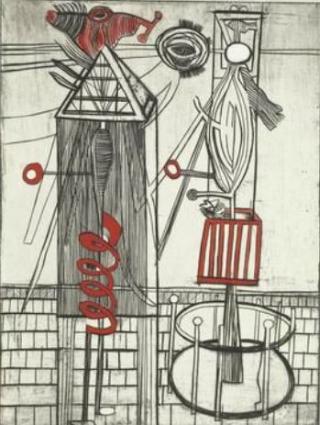
from the illustrated book,
He Disappeared into Complete Silence
Louise Bourgeois
the complete books and prints
moma
_______________________
A Lack of Order in the Floating Object Room
George Saunders
It’s like this, and it is no dream: First off, a plastic palomino and its stiff-armed rider float above a toybox. The rider is a dyed Custer, and everything’s red. I mean boots and kerchief and holster and eyebrows even. He is one ruined and reduced cavalryman, he was poured and solidified with horribly bowed legs, simply because his only reason for existence is to straddle the palomino. Denied Comanches. But the horse and rider float and revolve anyway, on the lookout for marauders. They rotate at about a revolution a minute, as per specs. Also: a velour basketball, half the size of a real basketball, hangs mid-aired over a crib. In the closet, the arms of tiny jackets and sweaters wave and salute wildly. The threads of the carpet flatten out like grass under a helicopter, and then circular waves run outward from the middle of the room. When the waves die down, it’s just a regular carpet again. The whole cycle takes three and a half minutes. An empty rocking chair rocks faster than any mortal granny could.
Out the wide window across the room, it’s a crescent moon in bough-crook kind of thing; caramel lights through sectioned panes in houses of white wood, trees blown and slanting like smoke. Windows and doors of the houses wide open with Trust. Children breathe pillow air. Hills roll away behind the row of houses in a fairly pastoral manner. It is a kind of smooth blue Ireland. And the blue is in the room too. It is the blue of night scenes in animation. The cloak of night and all that. It is very much like the nights when little kids point at the moon and say odd things. There is the smell of very clean carpet. There is no sound of bugs and no sound of rocking chair or wind or of anything scraping the windowpane. But you can hear the air conditioning. I rub my window clean and enjoy a soft drink.
...(more)
10 Free Stories by George Saunders
Open Culture
_______________________

photo - mw
_______________________
Camera Vacua
David Giles
(....)Let’s call them end-of-the-world photographs. There are a few basic rules defining the category: (1) the pictures are always empty of human beings; (2) their subjects are always human social spaces; and, in fact, (3) the pictures are typically concerned with the interior of these spaces, so that the viewer is brought or invited inside, e.g. inside a living room, office, prison, tunnel, city. And finally, (4) the space is never of the kind you just happen upon in the course of a normal day; on the contrary, either something extraordinary has occurred there, or all kinds of bureaucratic stamps-of-approval have been procured and arrangements made in order for the photographer to capture the image. (....) That’s a paradox, I want ultimately to suggest, that serves to shift photography’s traditional emphasis on the evidentiary to a very different emphasis on the ontological. In contrast to the conventional photographic mode, it doesn’t matter if the space is real or the photographic representation accurate, because the questions these pictures raise are on a different level of generality. What we’re led to wonder about is how any space like this could exist anywhere on the planet, and in case it does, as they almost all do, how and why they exist like that.
(....)
Susan Sontag and Roland Barthes, among others, have famously argued that an essential function of the photograph is to serve as a memento mori for the viewer. A photograph stops time at a certain historical moment, it is argued, and—at least in the case of the recreational snapshot—when the viewer returns to the photo years or even decades later, he or she is vividly, sometimes nostalgically, reminded of the loss of the intervening time. Interestingly, our end-of-the-world photographs don’t have this effect on us—quite the opposite, in fact. By selecting especially generic spaces and relegating historical cues to the perceptual and emotional perimeter, the photographer constructs an image that obviates this usual act of remembering. In this way, the viewer is prevented from entering into a subjective relationship with the picture, and the memento mori function of the photograph is itself generalized and made impersonal: without the invitation to recall a specific event in the past, we’re not likely to consider our own personal march toward death, as is the case with many photographs. Rather, as we contemplate these spaces and their implied practices, we recognize that historical time—or civilizational time—as a whole is coming to an end.
...(more)
Paper Monument a print journal of contemporary art published by n+1 and designed by Project Projects.
No 1-2 (2007-2008)
|














































